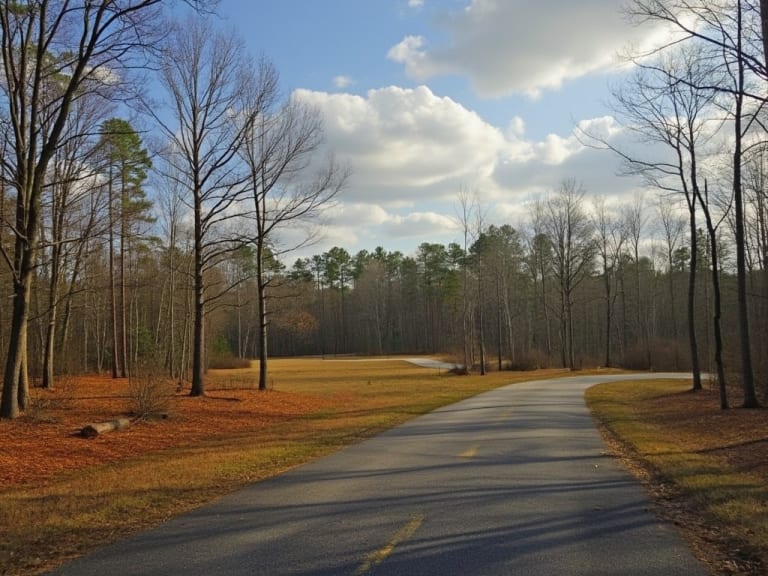North Carolina’s land market offers exceptional investment value with median prices of $20,349 per acre, making it the 13th most affordable state for land investment opportunities in America. Population projections indicate growth from 10.4 million to 15 million residents by 2040, creating sustained demand alongside distinctive features like varied terrains from mountains to coastline, tax advantages, and multiple income-generating options.
Key Takeaways
- Land values deliver affordability and strong potential returns, especially near expanding cities like Charlotte and Raleigh-Durham
- Multiple revenue channels exist through agricultural leasing, hunting rights, and green energy development
- Tax benefits boost property owner returns, including America’s lowest corporate tax rate (2.5%) and zero Social Security benefit taxation
- Investment choices span from Blue Ridge Mountain properties to Outer Banks parcels, creating rich opportunities across varied landscapes
- Rapid population expansion and flourishing job sectors, particularly in technology hubs, support steady land value growth
The Booming North Carolina Land Market: A Smart Investment Choice
Strong Population Trends Drive Land Values
North Carolina’s population surge creates excellent investment conditions. According to the NC Office of State Budget and Management, the state’s current 10.4 million residents will expand to 15 million by 2040, pushing land demand higher.
Affordable Entry Points for Investors
I find North Carolina’s land prices highly attractive for both new and experienced investors. With median prices at $20,349 per acre, the state ranks as the 13th most affordable for land purchases nationwide. This competitive pricing, combined with rising demand in major economic hubs like Charlotte and Raleigh-Durham, positions NC land as a solid investment choice.
Key market advantages include:
- Lower entry costs compared to neighboring states
- Strong appreciation potential in growing metropolitan areas
- Multiple development options from residential to commercial use
- Steady demand from both local and out-of-state buyers
Affordability Meets Prime Location
Smart Investment Opportunities
North Carolina offers exceptional value for land buyers, with prices starting at $10,000 per acre in many areas and rural plots available from $5,000 per acre. The state’s prime locations include thriving cities like Charlotte, Raleigh, and Asheville, each offering unique advantages for property investment.
I’ve found these key financial benefits make NC land particularly attractive:
- The Research Triangle continues to attract tech companies and high-paying jobs
- Corporate tax rate of 2.5% – the lowest in the United States
- Zero tax on Social Security benefits
- Lower property taxes compared to neighboring states
- Easy access to both mountains and coastline
These financial advantages, combined with strategic locations near growing job markets, make North Carolina land an ideal investment for both residential and commercial purposes.
Natural Beauty and Diverse Landscapes
From Mountains to Coast
North Carolina’s landscape stretches across stunning terrains, making it a prime location for land investment. The majestic Blue Ridge Mountains dominate the western region, while the pristine Outer Banks extend along the eastern coastline. Between these extremes, you’ll find fertile farmland and rolling hills perfect for various development opportunities.
The state’s natural resources add significant value to land ownership. With 18 million acres of managed forest land, timber rights can provide additional income streams. Fresh water access and mineral deposits further enhance property potential in specific regions.
Here’s what makes North Carolina’s geography exceptional for land buyers:
- Mountain properties near tourist hotspots like Asheville and Boone
- Coastal parcels with beach access and water views
- Agricultural land in the fertile Piedmont region
- Forest tracts with timber harvesting potential
- Properties with natural springs and water features
The climate creates ideal living conditions year-round. Mild winters in the lowlands and comfortable summers in the mountains attract both permanent residents and seasonal visitors. This weather pattern has driven strong growth in retirement communities and second-home markets across the state.

Income Generation and Development Potential
Multiple Revenue Streams
North Carolina land offers diverse income opportunities beyond traditional property appreciation. I recommend exploring agricultural leasing, where local farmers pay to use your land for crops or livestock grazing. Hunting leases provide steady seasonal income, particularly in wooded areas. Progressive landowners can tap into green energy markets through solar farm installations, while strategic locations near highways suit billboard placement or cell tower leases.
Key development opportunities exist near expanding job centers like:
- Durham’s tech corridor
- Wilmington’s coastal business district
- Asheville’s tourism-driven market
Each area shows strong potential for both commercial and residential projects. Before purchasing, I suggest checking utility access and existing infrastructure – these factors directly impact development costs and future returns. Raw land near these growth zones often costs less while offering substantial appreciation potential as urban boundaries expand.

Investment Stability and Property Rights
Financial and Legal Benefits
North Carolina offers excellent protection for private property rights, making land ownership secure and straightforward. I’ve found the state’s property laws particularly appealing since they allow unrestricted foreign ownership with minimal red tape. The absence of estate and inheritance taxes creates clear advantages for passing land down through generations. Property tax rates sit lower than many other states, reducing ongoing ownership costs. The steady population influx across major metro areas continues pushing land values up – here are the key financial perks:
- No estate or inheritance tax burden
- Lower property tax rates compared to neighboring states
- Strong legal framework protecting private property rights
- Unrestricted foreign ownership policies
- Consistent appreciation driven by 1.1% annual population growth

Location Factors and Value Drivers
Accessibility and Infrastructure
North Carolina’s land value spikes near major cities like Charlotte and Raleigh-Durham, with parcels close to I-85 and I-40 commanding premium prices. Properties within an hour of urban centers offer a sweet spot between rural charm and city convenience.
Growth and Development Potential
I’ve found several key features that boost land values in NC:
- Direct access to public utilities and high-speed internet
- Proximity to schools, hospitals, and shopping centers
- Quality soil composition for agriculture or construction
- Flexible zoning laws that allow multiple use options
- Location within established growth corridors
Land prices can vary by 200-300% between urban and rural areas, making outer regions attractive for investment. Parcels near future development projects or expanding infrastructure often appreciate faster than isolated rural properties. For landowners considering options, learning how to sell vacant land by owner can maximize returns on your investment.

